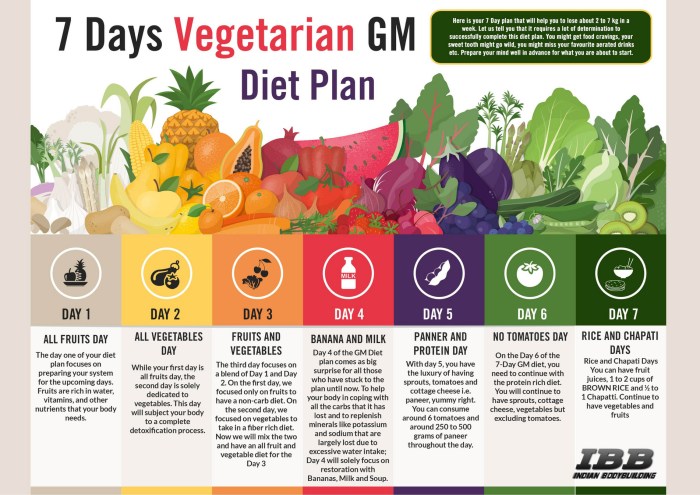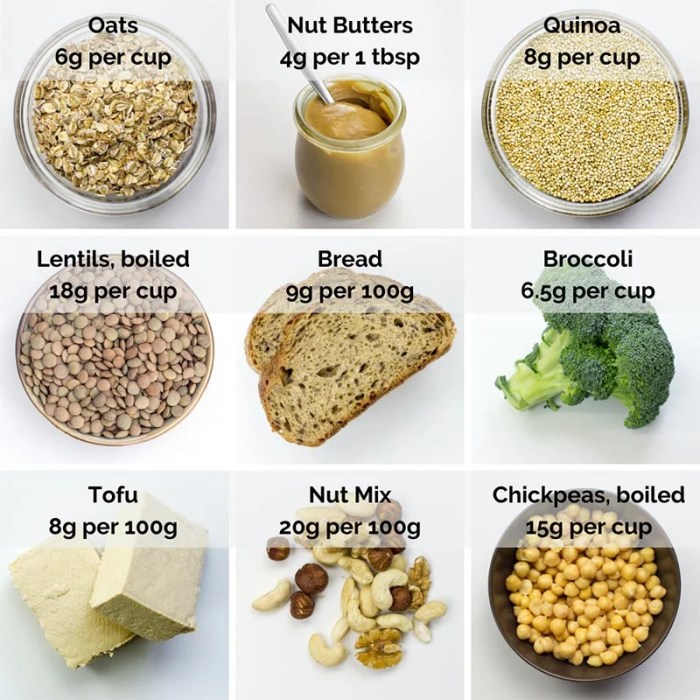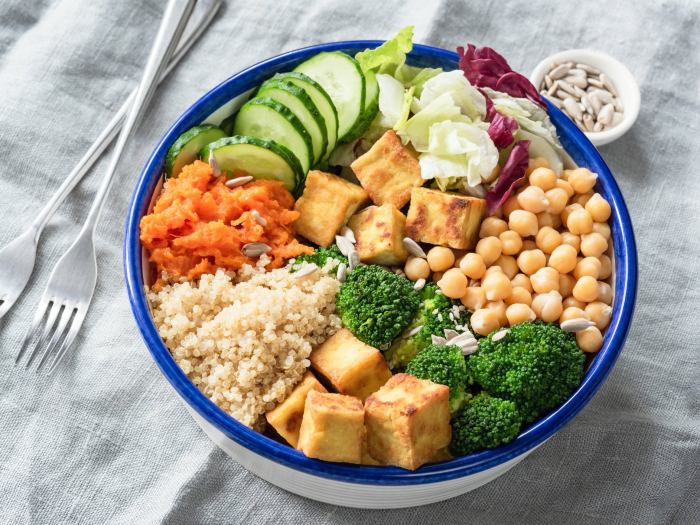A balanced vegetarian diet plan provides the essential nutrients your body needs to thrive. Discover the benefits of a vegetarian lifestyle and learn how to create a meal plan that supports your health and well-being.
Vegetarian diets have been linked to numerous health benefits, including reduced risk of heart disease, stroke, and certain types of cancer. By carefully planning your meals, you can ensure that you’re getting all the nutrients you need from plant-based sources.
Introduction to Balanced Vegetarian Diet Plans

Vegetarianism is a dietary practice that excludes meat, poultry, fish, and seafood. There are various types of vegetarian diets, ranging from lacto-vegetarian (includes dairy products) to vegan (excludes all animal products). Vegetarian diets offer numerous health benefits, including reduced risk of chronic diseases, improved cardiovascular health, and better weight management.
While vegetarian diets can provide all the essential nutrients, it is crucial to ensure a balanced intake to avoid potential deficiencies. A balanced vegetarian diet should include a variety of fruits, vegetables, whole grains, legumes, nuts, and seeds. It is also important to consider vitamin B12, iron, calcium, and omega-3 fatty acids, as these nutrients may be lower in vegetarian diets.
Nutritional Deficiencies in Vegetarian Diets
Vitamin B12:Vitamin B12 is primarily found in animal products. Vegetarians can obtain vitamin B12 from fortified foods, nutritional yeast, or supplements.
Iron:Iron is essential for red blood cell production. Plant-based sources of iron (non-heme iron) are less easily absorbed than heme iron found in animal products. To enhance iron absorption, vegetarians should consume iron-rich foods with vitamin C-rich foods.
Calcium:Calcium is important for bone health. Dairy products are a rich source of calcium, but vegetarians can also obtain calcium from fortified plant-based milk, leafy green vegetables, and tofu.
Omega-3 Fatty Acids:Omega-3 fatty acids are essential for heart health and brain function. Vegetarian sources of omega-3 fatty acids include flaxseed, chia seeds, and walnuts. However, these sources contain ALA (alpha-linolenic acid), which the body must convert to EPA (eicosapentaenoic acid) and DHA (docosahexaenoic acid).
Conversion rates can be low, so vegetarians may consider consuming algae-based supplements for EPA and DHA.
For those looking to improve their overall health, a fish and vegetable diet may be the answer. This diet emphasizes the consumption of fish, which is rich in omega-3 fatty acids, and vegetables, which provide essential vitamins, minerals, and fiber.
Essential Nutrients for Vegetarians
Maintaining a balanced vegetarian diet requires careful attention to ensure adequate intake of all essential nutrients. This includes protein, carbohydrates, fats, vitamins, and minerals, each playing a vital role in overall health and well-being.
Vegetarian diets exclude meat, poultry, and fish, but they can still provide all the necessary nutrients with proper planning. Plant-based sources offer a wide range of nutrient-rich foods to meet the body’s requirements.
Protein
Protein is essential for building and repairing tissues, producing enzymes and hormones, and supporting immune function. Plant-based sources of protein include:
- Legumes (beans, lentils, peas)
- Soy products (tofu, tempeh, edamame)
- Nuts and seeds
- Whole grains (quinoa, brown rice)
Carbohydrates
Carbohydrates provide energy and fiber, supporting digestion and overall health. Whole grains, fruits, and vegetables are excellent sources of carbohydrates for vegetarians.
- Whole grains (brown rice, quinoa, oats)
- Fruits (bananas, apples, berries)
- Vegetables (potatoes, sweet potatoes, carrots)
Fats
Fats are essential for hormone production, cell function, and energy storage. Healthy fats can be found in plant-based sources such as:
- Olive oil
- Avocados
- Nuts and seeds
Vitamins
Vitamins are organic compounds that play crucial roles in various bodily functions. Vegetarian diets may be low in certain vitamins, such as:
- Vitamin B12 (fortified plant-based foods, nutritional yeast)
- Vitamin D (fortified plant-based milk, sunlight)
- Iron (beans, lentils, leafy green vegetables)
- Calcium (fortified plant-based milk, leafy green vegetables)
Minerals
Minerals are inorganic elements that support various bodily functions. Vegetarian diets may be low in certain minerals, such as:
- Iron (beans, lentils, leafy green vegetables)
- Calcium (fortified plant-based milk, leafy green vegetables)
- Zinc (beans, lentils, nuts)
Role of Supplements
Supplements can play a role in ensuring adequate nutrient intake for vegetarians, especially for nutrients that are not easily obtained from plant-based sources. However, it is important to consult with a healthcare professional before taking any supplements.
Planning a Balanced Vegetarian Meal Plan
Creating a balanced vegetarian meal plan is essential for ensuring that you’re getting all the nutrients your body needs. By following these guidelines, you can create a meal plan that is both healthy and satisfying.
If you’re looking to improve your overall health and well-being, a fish and vegetable diet may be the perfect solution for you. This type of diet emphasizes consuming nutrient-rich fish and vegetables, which are packed with essential vitamins, minerals, and antioxidants.
By incorporating more fish and vegetables into your daily meals, you can support your heart health, reduce inflammation, and boost your immune system.
Meal planning is the process of planning your meals in advance. This can help you save time, money, and stress. It can also help you make sure that you’re eating a healthy diet.
Incorporating Variety, Flavor, and Nutritional Adequacy into Meals
When planning your vegetarian meals, it’s important to incorporate variety, flavor, and nutritional adequacy. Variety will help you avoid boredom and ensure that you’re getting a wide range of nutrients. Flavor will make your meals more enjoyable and satisfying. And nutritional adequacy will help you meet your body’s needs for vitamins, minerals, and other nutrients.
Here are some tips for incorporating variety, flavor, and nutritional adequacy into your vegetarian meals:
- Include a variety of fruits and vegetables in your meals. Fruits and vegetables are packed with vitamins, minerals, and fiber. They’re also low in calories and fat.
- Choose whole grains over refined grains. Whole grains are a good source of fiber, vitamins, and minerals. They’re also more filling than refined grains.
- Include a source of protein in each meal. Protein is essential for building and repairing tissues. Good sources of protein for vegetarians include beans, lentils, tofu, tempeh, nuts, and seeds.
- Use herbs and spices to add flavor to your meals. Herbs and spices can help you reduce your sodium intake while adding flavor to your food.
- Cook your meals at home. Cooking at home gives you more control over the ingredients in your food. It also allows you to experiment with new flavors and recipes.
Sample Balanced Vegetarian Diet Plan
A balanced vegetarian diet plan provides all the essential nutrients your body needs to function properly. It includes a variety of fruits, vegetables, whole grains, legumes, nuts, and seeds.To create a balanced vegetarian diet plan, you need to include foods from all food groups.
You should also make sure to get enough protein, iron, calcium, and vitamin B12.Here is a sample 7-day balanced vegetarian diet plan:
Day 1
- Breakfast:Oatmeal with berries and nuts (250 calories)
- Lunch:Lentil soup with whole-wheat bread (350 calories)
- Dinner:Tofu stir-fry with brown rice (400 calories)
- Snack:Apple with peanut butter (200 calories)
Additional Considerations for a Vegetarian Diet

Adopting a vegetarian diet requires careful planning to ensure adequate intake of essential nutrients. Beyond dietary considerations, several other factors contribute to overall health and well-being for vegetarians.
Maintaining proper hydration and engaging in regular physical activity are crucial for vegetarians as they are for individuals following other dietary patterns. Additionally, understanding the role of probiotics and fermented foods, as well as navigating dining out as a vegetarian, can help ensure a balanced and satisfying plant-based lifestyle.
Hydration and Physical Activity
Hydration is essential for overall health and can impact nutrient absorption and metabolism. Vegetarians may have higher fluid needs than non-vegetarians due to increased consumption of fiber-rich foods, which can promote water retention. Adequate fluid intake helps prevent dehydration and supports proper bodily functions.
Regular physical activity is also crucial for vegetarians, as it helps maintain a healthy weight, builds muscle mass, and improves cardiovascular health. Aim for at least 150 minutes of moderate-intensity aerobic activity or 75 minutes of vigorous-intensity aerobic activity per week.
Probiotics and Fermented Foods, Balanced vegetarian diet plan
Probiotics are live microorganisms that provide health benefits when consumed. Fermented foods, such as yogurt, kefir, sauerkraut, and kimchi, are rich sources of probiotics. Including fermented foods in a vegetarian diet can help improve digestion, boost the immune system, and support overall gut health.
Dining Out as a Vegetarian
Dining out as a vegetarian can be challenging, but with a little planning, it can be a rewarding experience. Here are a few tips:
- Research restaurants in advance to identify those with vegetarian-friendly options.
- Call ahead or check online menus to confirm availability of suitable dishes.
- Be prepared to ask questions about ingredients and preparation methods.
- Don’t hesitate to request modifications or substitutions to accommodate your dietary preferences.
Conclusion: Balanced Vegetarian Diet Plan

In conclusion, a balanced vegetarian diet can provide all the essential nutrients for optimal health. It is important to plan your meals carefully to ensure you are getting the right balance of protein, carbohydrates, fats, vitamins, and minerals. If you are considering adopting a vegetarian diet, it is important to consult with a healthcare professional for personalized advice.
Final Summary
Adopting a balanced vegetarian diet plan is a smart choice for your health and the planet. By following the guidelines Artikeld in this article, you can create a meal plan that provides all the essential nutrients your body needs. Remember to consult with a healthcare professional for personalized advice and to address any specific dietary concerns.
Common Queries
What are the benefits of a balanced vegetarian diet?
Vegetarian diets have been linked to reduced risk of heart disease, stroke, and certain types of cancer. They can also help you maintain a healthy weight, improve your digestion, and boost your energy levels.
What are some common nutrient deficiencies associated with vegetarian diets?
Vegetarians may be at risk for deficiencies in iron, vitamin B12, calcium, and omega-3 fatty acids. It’s important to plan your meals carefully and consider supplementation to ensure you’re getting all the nutrients you need.
How can I create a balanced vegetarian meal plan?
To create a balanced vegetarian meal plan, focus on including a variety of fruits, vegetables, whole grains, and legumes. Include plant-based sources of protein, such as beans, lentils, tofu, and tempeh. Aim for a balance of macronutrients (carbohydrates, protein, and fat) and make sure to get enough vitamins and minerals.